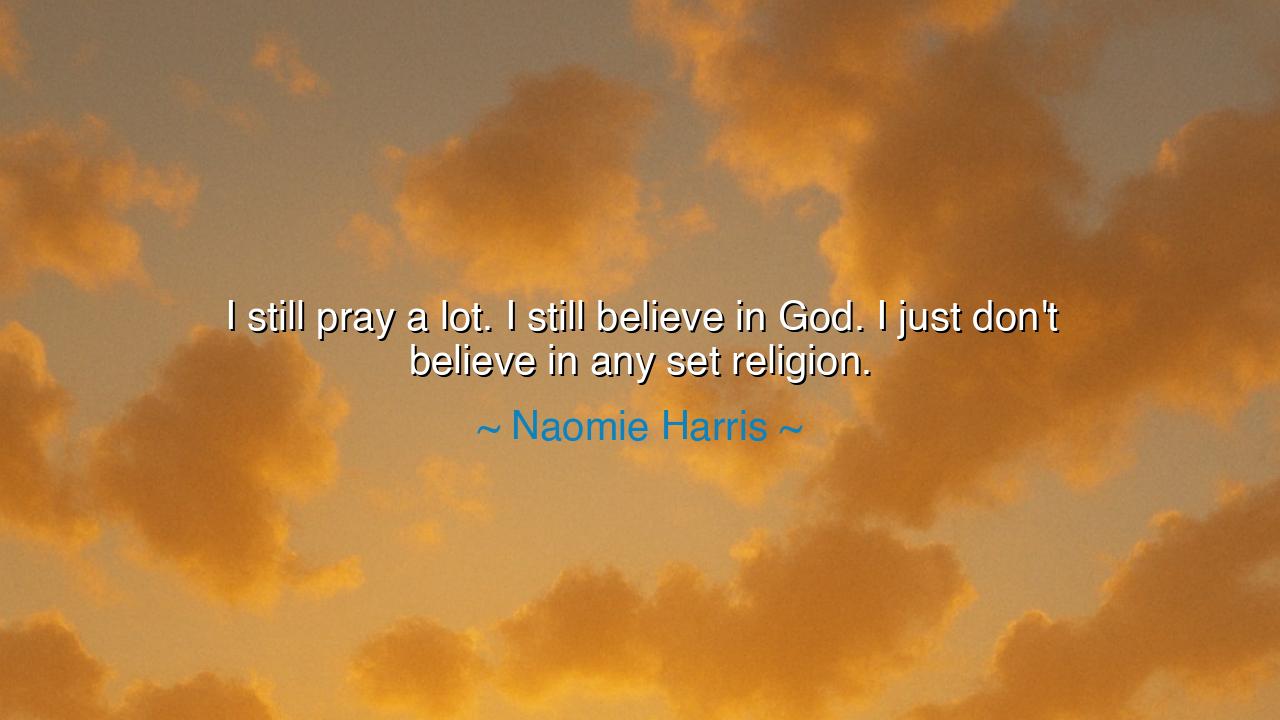
I still pray a lot. I still believe in God. I just don't believe






"I still pray a lot. I still believe in God. I just don't believe in any set religion." These words from Naomie Harris speak to a deeply personal and evolving relationship with faith and spirituality—one that transcends the rigid structures often associated with organized religion. Harris’ statement reflects a universal truth: while one may believe in a higher power, the need for a formalized religious system is not always necessary to experience connection, purpose, and meaning in life. Faith, as Harris implies, is a deeply personal journey, shaped not by doctrine or tradition, but by individual experience, reflection, and the desire to seek and embrace the divine.
In the ancient world, this idea was not unknown. The Greeks and Romans practiced religion through a complex web of rituals and gods, but at the same time, many of their greatest thinkers questioned the need for rigid structures. Socrates himself, who famously said, "I know that I know nothing," often found himself at odds with the established religious practices of his time. His philosophical inquiry into the nature of the divine and the self led him to reject conventional notions of the gods, though he still believed in a higher power—one that could be experienced through reason and reflection rather than ceremonial rites. In this way, Socrates exemplifies Harris' sentiment, recognizing that spirituality need not be confined to the walls of a temple or dictated by a set of prescribed rituals, but rather could be found in the pursuit of wisdom and understanding.
This sentiment is echoed in the history of Christian mysticism, particularly in the life of St. Teresa of Ávila, who sought a deeper connection with God not through the formal practices of the Church, but through prayer, contemplation, and inner experience. Despite the formalized religion of the Catholic Church, St. Teresa's profound spiritual experiences were deeply personal, marked by a mystical connection with the divine. Her works, such as The Interior Castle, speak to the journey of the soul towards God, not by adhering strictly to external religious laws, but by cultivating an intimate relationship with the divine within. She, like Harris, found spirituality outside of rigid institutional structures, exploring a more personal connection to the divine that transcended religious dogma.
Consider the example of Mahatma Gandhi, a man who lived in accordance with deeply spiritual beliefs yet did not conform to any single religious institution. Gandhi practiced Hinduism, but his life was shaped by a blend of religious and philosophical principles, including aspects of Christianity, Buddhism, and Islam. His commitment to ahimsa (non-violence) and satya (truth) was born not from adherence to a rigid set of beliefs, but from his personal understanding of morality and faith. Gandhi’s life demonstrates that the pursuit of the divine can transcend the walls of organized religion, and that spirituality is a deeply individual experience that can be shaped by one's personal quest for truth and peace.
Naomie Harris’s words also reflect a growing trend in the modern world, where many individuals are turning away from traditional religious structures and instead seeking a more personal and individualized experience of the divine. The rise of spiritual but not religious (SBNR) movements around the world mirrors this shift—a recognition that faith does not need to be tied to dogma or doctrine. Many find meaning in prayer, meditation, or personal reflection, rather than in formal religious observances. Science, too, has contributed to this shift by offering different ways of understanding human nature, the universe, and the divine, providing alternative paths to spirituality that are not limited by the boundaries of organized religion.
The lesson in Harris' words is that faith is a deeply personal journey, not necessarily confined to the structures of religion or the traditions that have been handed down. Just as Socrates, Gandhi, and St. Teresa sought a direct connection with the divine, we too must remember that spirituality is not something that can be dictated or institutionalized. It is a relationship that is formed within, through personal reflection, prayer, and action. We must be open to exploration, and allow our faith to evolve and grow in a way that resonates with our individual experiences and the realities of the world we live in.
In our own lives, we must strive to cultivate a spirituality that is authentic and meaningful to us. This may involve prayer, meditation, or seeking wisdom from a variety of sources. We must not be afraid to question, to challenge, or to seek out new ways to connect with the divine. As Naomie Harris suggests, we do not need to conform to a set religion to have a relationship with the divine; what matters is our willingness to seek, to listen, and to live in accordance with our truth. Each of us holds within us the potential for a unique and personal connection to the divine, one that transcends external institutions and touches the deepest parts of our souls. May we each find the path that leads us to peace, understanding, and love, no matter where it may take us.






AAdministratorAdministrator
Welcome, honored guests. Please leave a comment, we will respond soon